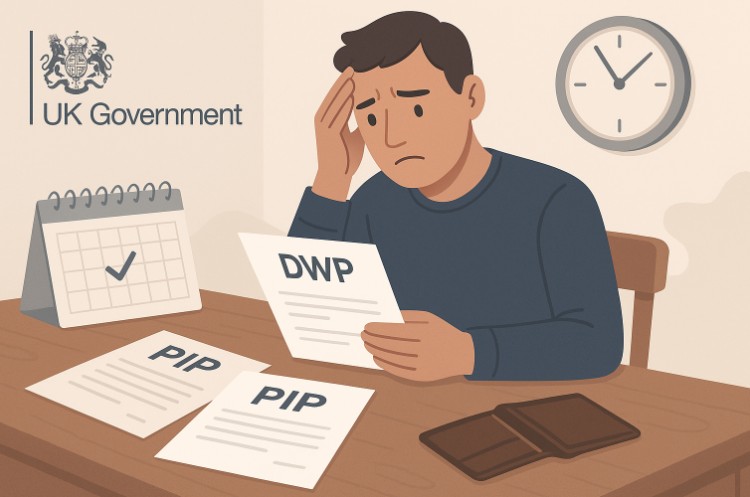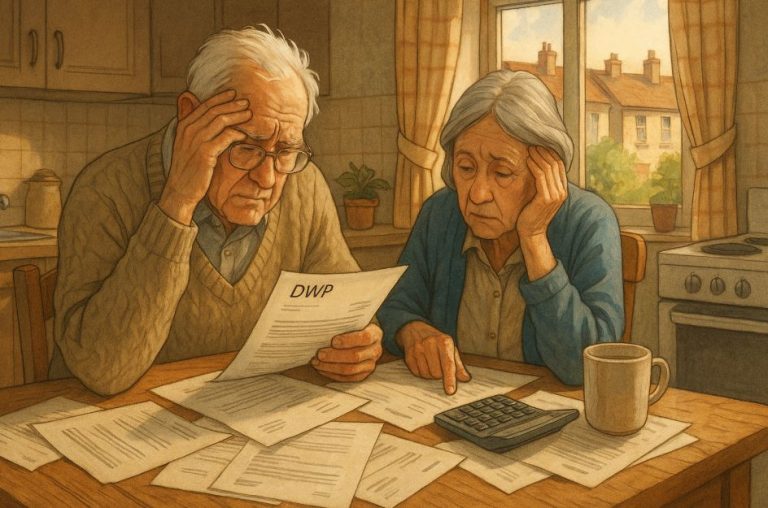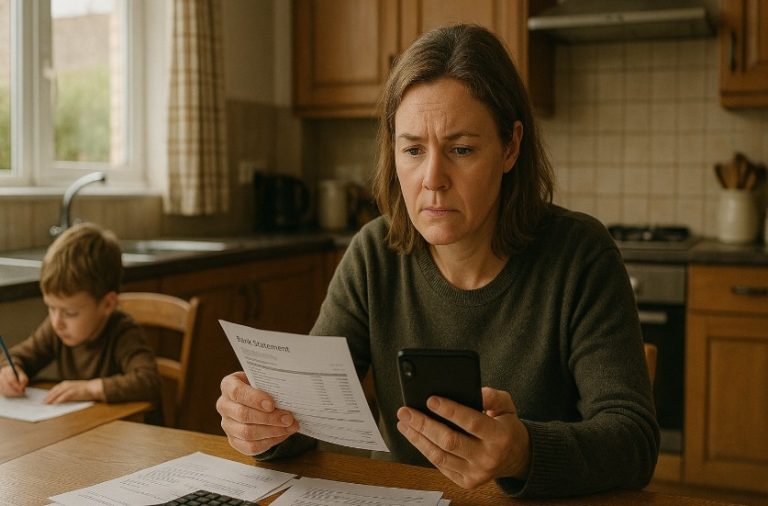Personal Independence Payment (PIP) is a vital benefit for many people in the UK living with long-term health conditions or disabilities. One of the most common questions people ask is: “Can I claim PIP if I work?” The answer is yes.
This article will explain the eligibility rules in detail, clarify common misconceptions, and guide you through what to expect if you’re employed and considering applying for PIP.
What Is PIP and How Does It Work?

Personal Independence Payment (PIP) is a benefit designed to help people in the UK who live with long-term physical or mental health conditions.
The purpose of PIP is to provide financial support for individuals who face difficulties with daily living or mobility. It is not affected by your income, savings, or employment status.
PIP is split into two components:
- Daily Living Component: For individuals who need assistance with daily tasks such as preparing food, managing medications, and washing or dressing.
- Mobility Component: For individuals who struggle to move around or plan and follow a journey.
Each component is paid at either a standard or enhanced rate depending on how much help you need.
Can You Still Get PIP If You’re Employed?
Yes, employment does not disqualify you from claiming PIP. Many people believe that receiving a salary or working part-time automatically excludes them, but this is incorrect.
PIP is based solely on how your condition affects your ability to manage everyday tasks and mobility, not whether you are in work or how much you earn.
Whether you are employed full-time, part-time, or self-employed, you can claim PIP if you meet the qualifying criteria. The Department for Work and Pensions (DWP) focuses on the impact of your health condition rather than your job title or working hours.
How Does Working Affect Your PIP Assessment?
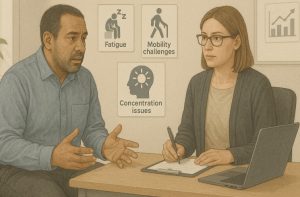
One of the most common concerns for people considering a Personal Independence Payment (PIP) claim is whether working either part-time, full-time, or self-employed will negatively influence the outcome of their assessment.
It’s a reasonable concern, especially because PIP is designed to support people who have difficulty with daily living activities or mobility. However, the reality is that being employed does not automatically mean you are ineligible for PIP.
The Role of the PIP Assessment
The PIP assessment is designed to measure how your health condition or disability impacts your ability to carry out certain activities not whether you work or not. The assessment is functional, meaning it focuses on what you can or cannot do reliably over a sustained period, rather than your diagnosis alone.
The Department for Work and Pensions (DWP) will assess how your condition affects you in the following key areas:
- Preparing and cooking food
- Managing treatment and medications
- Washing, bathing, and using the toilet
- Dressing and undressing
- Communicating and engaging with other people
- Making budgeting decisions
- Planning and following journeys
- Physically moving around
Your ability to perform these tasks is assessed using the following key standards:
- Safely: Can you do the task without risk to yourself or others?
- To an acceptable standard: Can you do the task properly and without significant issues?
- Repeatedly: Can you do the task multiple times across the day if needed?
- Within a reasonable time: Can you complete the task without taking much longer than someone without a disability?
How Employment May Be Considered?
While employment does not disqualify you from receiving PIP, your job role may be taken into consideration during the assessment if it appears to contradict the difficulties you’ve described in your application.
For instance, if someone states that they have severe social anxiety but works in a customer service role without adjustments, the assessor may probe further to understand how the condition affects them in a practical setting.
This doesn’t mean the application will be denied, but you should be ready to explain clearly:
- What support or adjustments are made for you at work
- Whether your employer has made reasonable accommodations under the Equality Act 2010
- If you rely on medication, aids, or assistance while at work
- How working affects your health condition (for example, do you feel more exhausted after work or does your condition flare up due to job duties?)
Examples of How Work and Condition Interact
Here are some practical examples of how a claimant’s employment and health condition might interact and how it could be presented during a PIP assessment:
| Work Scenario | Potential Health Impact | How to Frame for Assessment |
| Office worker with chronic fatigue | May need rest breaks every hour; struggles with concentration | Explain reliance on flexible hours, reduced productivity, or home working |
| Retail assistant with arthritis | Standing or moving for long periods causes severe joint pain | Detail how mobility aids or adapted duties are necessary |
| Call centre employee with anxiety and PTSD | Finds communication exhausting; frequent panic attacks | Describe coping strategies and mental exhaustion after work |
| Delivery driver with epilepsy | Cannot drive due to seizure risk; needs another role | Clarify work reassignment and reliance on public transport |
These examples highlight that even if someone is working, they may still be significantly impacted by their condition in a way that meets the criteria for PIP.
What You Should Highlight in the Assessment?
To ensure your working status does not undermine your claim, you should focus on:
- What happens behind the scenes: Just because you can attend work does not mean you’re not struggling. You may be masking symptoms or forcing yourself through pain or fatigue.
- Fluctuating conditions: Many health issues are not consistent day to day. Describe how symptoms vary and the bad days as well as the good.
- Hidden limitations: Mental health conditions, chronic pain, fatigue, or neurological disorders may not be visible but still significantly affect your functioning.
Also, be honest if your ability to work is made possible only because of:
- Adjusted duties
- Reduced working hours
- Support from colleagues
- Assistive technology or aids
- Specific physical environments (such as ergonomic chairs or quiet rooms)
Misunderstandings to Avoid
There are a few misconceptions that can hurt your claim if you don’t address them clearly:
- “If I’m working, I must be fine”: This is not true. Many people work out of financial necessity or manage only because of significant support and adjustments.
- “The assessor will know how hard it is”: They won’t unless you tell them. It’s important to explain your reality, not assume they will fill in the blanks.
- “They will understand if I’m brief”: The more detailed and specific you are, the stronger your case will be.
In short, being employed is not a barrier to receiving PIP. What matters is how your condition affects you functionally, whether at work or in your personal life.
The assessment may ask about your job only to see how it fits into the wider context of your condition, not to determine eligibility in isolation.
Are There Any Limits to Working Hours or Income to Qualify for PIP?
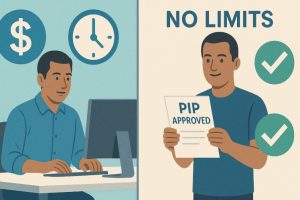
There are no restrictions on how many hours you can work or how much income you can earn when claiming PIP. This is a fundamental difference between PIP and other benefits like Universal Credit or Employment and Support Allowance (ESA), which are means-tested and consider your income and savings.
Here is a comparison to clarify:
| Benefit | Means-Tested | Income Affects Eligibility | Work Hours Limit |
| PIP | No | No | No |
| Universal Credit | Yes | Yes | Yes |
| ESA | Yes | Yes | Yes |
PIP is strictly based on how your health condition impacts your life. It’s not dependent on your financial circumstances.
What Health Conditions Qualify You for PIP While Working?
Eligibility for PIP is determined not by a specific diagnosis but by how your condition affects your ability to function on a daily basis. Many people with a wide range of health conditions receive PIP, including both physical and mental health issues.
Here are examples of conditions often reported by working PIP claimants:
- Depression, anxiety, and other mental health disorders
- Chronic pain conditions such as fibromyalgia or arthritis
- Neurological conditions like epilepsy, MS, or Parkinson’s
- Cardiovascular diseases or diabetes
- Learning disabilities or cognitive impairments
- Sensory impairments including visual or hearing difficulties
The DWP evaluates how these conditions impact your ability to manage tasks such as preparing food, managing personal care, moving around, or interacting with others.
What Documents and Evidence Should You Provide When Applying?
Gathering strong evidence is a key part of a successful PIP claim, especially if you’re working. It’s essential to demonstrate how your condition affects your functional ability, not just to explain your diagnosis.
Documents you may need include:
- Medical records, GP letters, or hospital discharge notes
- Treatment plans or prescriptions
- Written statements from your employer about reasonable adjustments made for you at work
- Personal logs or diaries showing how your condition affects your daily life
- Supporting statements from family members or carers
This evidence should focus on practical examples of the difficulties you face and should align with the information you provide in your PIP form.
How Do You Apply for PIP If You’re Working?
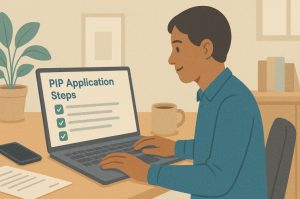
The PIP application process is the same regardless of whether you are employed or not. You start by contacting the DWP, who will send you a form titled “How your disability affects you.”
Here are the main steps involved in applying:
- Call the DWP to begin your claim or use the online service.
- Fill in the PIP2 form detailing how your condition impacts your daily life.
- Submit medical and supporting evidence along with the form.
- Attend an assessment if required, which may be in person, over the phone, or via video call.
- Wait for the decision letter, which will confirm whether your claim has been approved and at what rate.
Your employment status should be mentioned where relevant, especially if your job role highlights how your condition affects you or what adjustments have been made for you.
What Should You Expect During a PIP Assessment?
The PIP assessment is not a medical examination. It is focused on your ability to carry out specific activities related to daily living and mobility. If you are working, the assessor may ask you questions about your job, but only to understand how your condition affects your work tasks.
The assessment will explore:
- Whether you need assistance to perform tasks
- If tasks can be done safely and within a reasonable time
- How often your condition affects your ability to function
For example, if you have mobility issues but still manage to commute to work, the assessor may ask about any aids you use or whether someone helps you. If you have a mental health condition, questions may focus on how you manage social situations or concentration at work.
Can Your PIP Be Affected If Your Work Situation Changes?
While PIP does not require you to report employment changes, you are expected to report any change in your condition that affects your ability to function.
For example, if you start a more physically demanding job and this impacts your health or requires you to use new aids or take more breaks, you should inform the DWP.
Likewise, if your health improves or deteriorates significantly, this may lead to a reassessment of your PIP award.
Here is a guide to changes that might or might not need to be reported:
| Change in Circumstance | Report to DWP? |
| Started or stopped a job | Not required |
| Health condition improved or worsened | Required |
| Change in how your condition affects you | Required |
| Moved to Scotland or from Scotland | Required |
Failure to report relevant changes could affect your payments or result in overpayments that must be repaid.
What Other Support Can You Get Alongside PIP While Working?
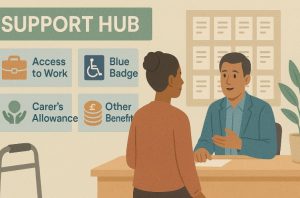
Claiming PIP may also entitle you to additional support services or financial assistance, especially if your condition affects your ability to work or move around.
Examples of support available include:
- Access to Work grants for special equipment, transport, or a job coach
- Disabled Person’s Bus Pass or Railcard
- Blue Badge scheme for easier parking access
- Carer’s Allowance if someone helps you frequently
- Council Tax Reduction if you receive the enhanced PIP rate
This additional help can significantly improve your quality of life and make working with a disability more manageable.
FAQs
What is the main reason people are denied PIP while working?
Many are denied due to insufficient evidence showing how their condition affects daily tasks, rather than because they are employed.
Does having a job make a PIP assessment harder?
Not necessarily, but assessors may scrutinise how your job duties align with the difficulties you report.
Can PIP be backdated if I apply while working?
PIP is usually backdated to the date you first contacted DWP to start your claim, regardless of employment.
Do I need to tell my employer I’m claiming PIP?
No, claiming PIP is a private matter. You only need to inform your employer if workplace adjustments are needed.
Will claiming PIP affect my income tax?
No, PIP is not taxable, and it does not affect your tax code.
Can I receive both PIP and Universal Credit while working?
Yes, but Universal Credit is means-tested, so PIP won’t affect the amount, but your earnings might.
What happens if I get a new job after being awarded PIP?
You should only report this if your health condition or ability to perform daily tasks changes as a result.
Related Articles:


